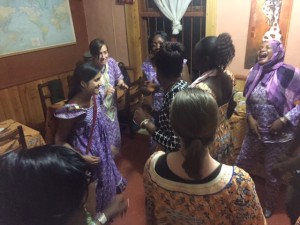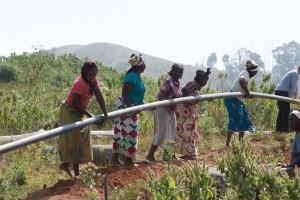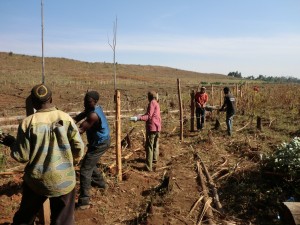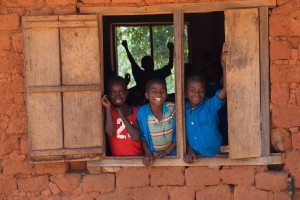After four days of travel, our team arrived in Mbokop, where they are furthering project efforts with the local community. In total, they will have flown over 7,500 miles between three continents and driven over 250 miles in Cameroon to arrive at their destination.
The travel days provided them with some wonderful experiences and opportunities. The team was able to meet with the staff of the US Embassy in Yaounde, Cameroon, discussing the kind of projects the embassy is currently undertaking in Cameroon. They also scouted out some hardware stores in Yaounde for any supplies they may need, and managed to do a little side shopping for dresses for International Women’s Day.
In Kumbo, they connected with Peace Corps volunteers and in-country contacts, and celebrated International Women’s Day with a group of Cameroonian friends.
In Mbokop, they will have eight very busy days of work alongside the community before beginning the three day trip back home. During these eight days, the team will focus in three key areas: Project Implementation, Community Engagement & Education, and Assessment.
Project Implementation
Due to the physical scope and complexity of this system (with multiple major components spread out over more than a mile of terrain), the construction of the water system has been progressing over several trips to the community. How much work that can be completed with each trip is limited by the in-country time of the EWB team and the fundraising speed of the community, as EWB requires the community to fund at least 5% of total implementation costs.
For this trip, the two main implementation tasks will be the following:
 Continue the installation of pipeline between the existing system and the site of the future storage tank.
Continue the installation of pipeline between the existing system and the site of the future storage tank.
There is over 2,600 ft (800m) of pipe left to install until the system reaches the location of the future storage tank. For the March Madness fans out there, that is over 30 basketball courts. If you’re still stuck in February, that is well over 7 football fields.
Improve the protection around the water catchment system to prevent contamination or destruction. 
Protection of the water catchment system (where groundwater is collected) is essential to ensuring that the community is provided with a clean source of water. Without catchment protection, animals could defecate in the area, contaminating the water. People could farm on the land, adding fertilizer and pesticides to the water source. Even natural disasters such as fire can destroy root growth in the area, weakening soils and causing the system to crumble.
On previous trips, the team installed a “dead fence” (barbed-wire fence) and completed a majority of the clearing/grubbing of hazardous or highly-flammable shrubs. On this trip, a local NGO partner will provide expertise towards installing a “live fence,” by planting seedlings of locally sourced plants, which will grow up to serve as natural barrier for the area.
As always, the EWB team will work side-by-side with the community in completing these tasks.
Community Engagement & Education
 While some members of the EWB team are building pipeline and fence, other members will be engaging the local community through engagement meetings. This is equally important to the success of the project, as it gathers information on the community’s perspective, shares information about the system, and helps provide knowledge on system care.
While some members of the EWB team are building pipeline and fence, other members will be engaging the local community through engagement meetings. This is equally important to the success of the project, as it gathers information on the community’s perspective, shares information about the system, and helps provide knowledge on system care.
While some meetings will provide general information to community, others will be more focused. The team members will meet with the local Water Committee, which is comprised of members of the community who help spearhead fundraising efforts. These conversations will help the team and community understand the current budget and develop the financial strategies needed for meeting project goals.
EWB will also meet with the Health Committee, which focuses on keeping the water source and fellow community members healthy.
The team will meet with the caretakers of the system to review operations and maintenance procedures to ensure the long-term sustainability of the system. Furthermore, they will meet with children at school to provide critical information on caring for the system. The team hopes to work with children to draw signs for the catchment area, warning individuals not to cross the barrier and possibly contaminate the water supply.
Assessment
 A portion of this trip will be dedicated to the assessment of the water system to date. This includes inspecting the system for any potential malfunctions, gathering water samples for water quality testing, and mapping out the future pathway of the pipeline.
A portion of this trip will be dedicated to the assessment of the water system to date. This includes inspecting the system for any potential malfunctions, gathering water samples for water quality testing, and mapping out the future pathway of the pipeline.
Due to geological advantages, the pipeline was shifted with the last trip approximately 9-16 ft (3-5m) to the other side of a main road. As a result, the team will need to update the elevation profile of the existing pipeline and proposed pipeline to ensure accuracy of our calculations and the success of the system. The new location of the pipeline may cross such obstacles as trees, rocks, and even farms, so the team will need to determine what exactly lies on the route ahead.
The team will also visit the neighboring towns of Ntayi and Njampjing to assess existing water systems and determine what EWB can do to repair or optimize them. As happens with a number of philanthropic efforts, the water systems in Njampjing and Ntayi were constructed more than three decades ago. Shortly after installation, the NGO has since left the area and the water systems have not been properly maintained and need extensive improvements.
To help ensure system sustainability, EWB ensures each of their project teams stay with a community after installation to ensure everything is working properly, as well as strive to use the most sustainable means possible to complete projects. A more sustainable systems inherently lasts longer, and allows for the local community to repair and care for it for years and decades to come.
“How can I help?”
EWB-DC has three active projects: one in Cameroon, one in Panama, and one in El-Salvador. All of our team members are volunteers who donate time, expertise, and energy after their jobs or days in classes. We are a mix of professionals and graduate students who came together to contribute various areas of expertise. Our efforts would not be possible without your support. Please consider donating to EWB-DC today to help contribute to our projects around the world. On behalf of our communities and hard-working volunteers, thank you for your support!
Share this post on Twitter! [socialwrap align=”left”] [socialicon name=”fb” url=”https://www.facebook.com/ewbdc/” ][/socialicon] [socialicon name=”linkedin” url=”https://www.linkedin.com/groups/5137268″ ][/socialicon] [socialicon name=”twitter” url=”https://twitter.com/ewbdc” ][/socialicon] [/socialwrap]
